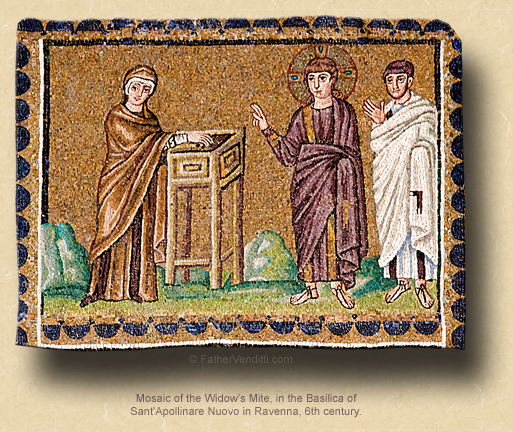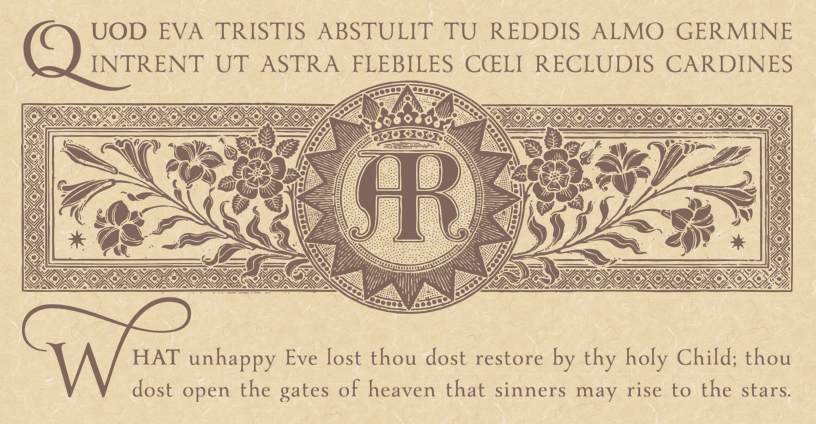Do All Things in the Name of God, and You Will Do All Things Well.
The Ninth Saturday of Ordinary Time; or, the Memorial of the Blessed Virgin Mary on Saturday.
Lessons from the primary feria, according to the ordinary form of the Roman Rite:
• Tobit 12: 1, 5-15, 20.
• [Responsorial] Tobit 13: 2, 6-8.
• Mark 13: 38-44.
|
When the memorial is taken, lessons from the feria as above, or any lessons from the common of the Blessed Virgin Mary.
|
Ember Saturday of Pentecost.*
Lessons from the Octave, according to the extraordinary form of the Roman Rite:
• Joel 2: 28-32.
• Leviticus 23: 9-11, 15-17, 21.
• Deuteronomy 26: 1-3, 7-11.
• Leviticus 26: 3-12.
• Daniel 3: 47-51.
• Romans 5: 1-5.
• [Sequence] Veni, Sancte Spiritus…**
• [The Gradual is omitted.]
• [Tract] Psalm 116: 1-2.
• Luke 4: 38-44.
The Otdanije (Leave-Taking) of Pentecost.***
Lessons from the pentecostarion, according to the Ruthenian recension of the Byzantine Rite:
• Romans 1: 7-12.
• Matthew 5: 42-48.
FatherVenditti.com
|
9:49 AM 6/10/2017 — Today's Gospel lesson is very familiar to all of us. We will hear it again down the road on one of the last Sundays in Ordinary Time and, back during my days as a parish priest, the diocese would always arrange to have the annual Bishop's Appeal begin on the day this passage was read; I guess they wanted to make sure every poor widow was giving her last two cents. But the point of the episode is simplicity itself: generosity, at least in the mind of our Lord, is never a question of how much, but of how much of a sacrifice it is. The contribution made by the widow observed by our Lord was worth more, even though it was much smaller than everyone else’s, because it came from what she, herself, needed to live on. It's not a complicated lesson, and it seems almost incredulous that our Lord would feel the need to even pull his disciples aside to explain it to them. He does so, of course, because it enables Saint Mark to make a note of it for us so we can read about it and share in the lesson.
If there was someone keeping a record of what was being given in the Temple that day, he probably wouldn’t have even bothered to record the widow’s contribution, judging it not worth recording, which stands in stark contrast to our Lord’s observation that it was the most important contribution made that day, and it highlights the fact that what God considers important is often not what we consider important. His standard of measurement and ours are not the same! We’ve conditioned ourselves to be impressed by the big gesture that attracts everyone’s attention. The real estate mogul who donates a new climate control system to the church gets himself named “Parishioner of the Year,” but the minimum wager who manages to drop a five dollar bill he probably needs himself into the basket is never noticed. Our Lord today challenges us to question which is more valuable in the eternal scheme of things.

What the example of the widow teaches us is that we touch God’s heart the most in the only way most of us can: through the little things. Saint Josemaría Escrivá once said, “Have you noticed how human love consists of little things? Well, divine Love also consists of little things” (The Way, 824). And how true that is! Anyone who’s been in any kind of relationship, whether in marriage or in simple friendship, knows how important little things are: the way one speaks, the way one acts, little acts of kindness or consolation are more important than the most expensive of gifts. And our relationship with God is no different. The person who loves God is the person who knows how to turn everything he does, no matter how mundane or inconsequential it may seem, into something very pleasing to God. And because it is pleasing to God, it becomes something of great value.
Today in our prayer we can consider the vast number of opportunities that present themselves to us every day to turn our daily tasks into works of love for God. In his Introduction to the Devout Life, Saint Francis de Sales said, “Great opportunities to serve God seldom arise, but little ones are frequent. Understand then that he who is faithful over a few things will be placed over many. Do all things in the name of God, and you will do all things well” (III, 34).

* Cf. the second footnote attached to the post here for an explanation of the Ember Days.
** Cf. the footnote attached to the post here for a translaton of the sequence.
*** In the Byzantine Tradition, major feast days are marked by prefestive and postfestive periods. While there is no corresponding tradition in the West regarding prefestive days, the postfestive period is concomitant with the concept of an octave in the Latin Church, though it's duration is not necessarily eight days depending on the importance of the feast. The last day of the postfestive period is called the "Leave-Taking," Otdanije in Slavonic, actually a verb meaning "to return." The liturgy on the day of Otdanije mirrors that of the feast with minor variations.
|

